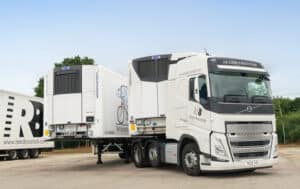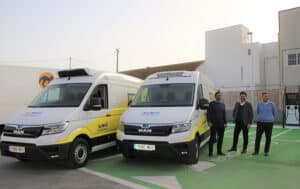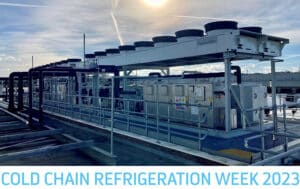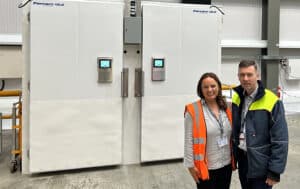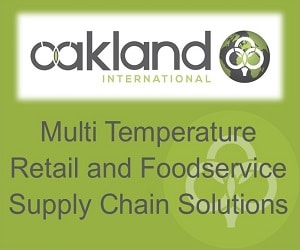The University of Nottingham is kick-starting a new £1m project to develop dual-use energy storage technology, capable of delivering hydrogen to a fuel cell and generating direct cooling for refrigeration.
The system would allow hydrogen power to become a key part of the UK’s sustainable energy future and to help decarbonise the UK’s food cold chain, which is responsible for 18% of the country’s total energy use.
What is the issue?
The technology will target commercial food operations where refrigeration can be responsible for 30-60% of electricity usage (1.2% of the UK’s total CO2 emissions).
In addition to factories and processing plants, the UK food industry also operates a network of 84,000 refrigerated heavy goods vehicles (HGVs) to transport perishable goods.
Up to 24% of the power output of refrigerated trucks used across the network is required to meet refrigeration demand, resulting in significant CO2 emissions.
Successful implementation of the technology will reduce the UK food cold chain’s dependency on imported energy and accelerate the large-scale roll out of hydrogen fuel cells for HGV applications. This could lead to an increase in operating efficiency with a corresponding reduction in commercial operating costs, potentially making the UK more economically competitive.
Background
The project aims to produce a highly-efficient, innovative and cost-effective dual-use hydrogen storage technology that, due to its versatility, can be used in a range of industrial cooling processes.
Project lead, Dr Sanliang Ling from the Advanced Materials Research Group said, “We aim to develop integrated hydrogen storage technologies that will simultaneously provide the controlled release of hydrogen to service fuel cell power needs and direct cooling.
“Our new technology provides an opportunity to assist in the decarbonisation of the UK food cold chain from farm to fork. This is essential as heating and cooling accounts for over a third of CO2 emissions in the UK.”
How it works
Funded by the Engineering and Physical Sciences Research Council, the three-year project, which involves expertise from the Faculty of Engineering and Nottingham University Business School, has three key objectives:
1) Formulate and validate a new intermetallic alloy suitable for dual-use hydrogen storage system for different applications in the UK food cold chain. Critical properties of the alloy include the hydrogen gravimetric/volumetric density and the pressure at which hydrogen can be supplied to a fuel cell across relevant cooling temperatures.
2) Design and develop a prototype dual-use intermetallic alloy based hydrogen store. The effective use of the store’s hydrogen and thermal capacities, system efficiency and cooling power of a dual-use hydrogen system will be tested under operational conditions commensurate with the requirements of commercial operators prevalent in the UK food cold chain.
3) Survey key operators in the UK food transport industry to identify barriers to using hydrogen technology to decarbonise current practices.
Minister for Climate Change Lord Callanan said: “The way we use energy in our buildings makes up almost a third of all UK carbon emissions. Reducing that to virtually zero is going to be key to eradicating our contribution to climate change by 2050.
“That’s why it’s important that innovative projects like Decarbonisation Of Food Cold Chain Through Integrated Hydrogen Technologies and Variable-Temperature Thermochemical Energy Storage System (VTTESS) in Nottingham receive backing to develop new and effective ways to heat and cool our homes and workspaces, helping drive down the costs of low-carbon technologies so everyone can feel the benefits of cheaper and greener energy.”
Part of the research will be supported by University’s Propulsion Futures Beacon and will utilise their world-class facilities and equipment including the Beacon Devices Lab and the Hydrogen Systems Test Bed based in the Research Acceleration and Demonstration Building supported by the Energy Research Accelerator initiative.






